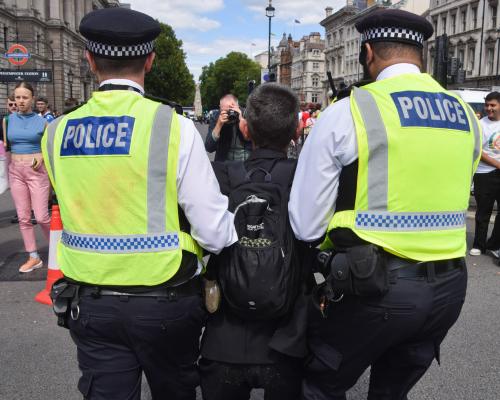
Plans to disclose the ethnicity and immigration status of criminal suspects in the UK have been condemned by race campaigners for setting a dangerous precedent for “dog-whistle politics”, which will make “Black and brown communities more vulnerable”.
The home secretary, Yvette Cooper, has welcomed new police guidelines released on Wednesday which encourage forces to release the race and nationality of those charged in high-profile cases.
It is meant to combat misinformation on social media, which spread last summer after the murder of three schoolgirls in Southport. False information about the killer’s nationality, religion and asylum status fuelled widespread unrest throughout the country.
But race campaigners believe the move may encourage focus on the racial background of suspects, and will lead to further rightwing conspiracy theories when information is not released to the public.
Enny Choudhury, the co-head of legal at the Joint Council for the Welfare of Immigrants, said: “Releasing the ethnicity of everyone suspected of serious crimes will … simply fuel mistrust, deepen divisions, and make Black and brown communities more vulnerable to prejudice and harm.
“Some point to cases like Southport, where rumours were quashed by releasing specific information. But building a blanket policy around this is dangerous. It turns race into a variable in policing and public debate– when we know the vast majority of serious crimes, including sexual offences, are committed by white men.
“The role of the justice system should be to unite communities in pursuit of justice, not to single people out because of their ethnicity.”
Peter Herbert, from the Society of Black Lawyers, questioned the role of the police around issues of ethnicity and nationality when forces still face allegations of institutional racism.
He said: “The disclosure of ethnicity in particular is especially sensitive. People have never committed crimes on the basis of their ethnicity or nationality, and therefore the whole premise about releasing this information in certain cases sets a dangerous precedent.
“One only has to remember the misinformation the surrounded the killing of Jean Charles de Menezes to understand the police themselves are often guilty of putting out misinformation which exacerbates public concern and fear.
“Conspiracy theorists are rarely satisfied by official announcements and therefore tagging ethnicity and nationality, even in a limited amount of cases, opens a dangerous door to widespread xenophobia and racism, enabling the criminal justice system to be used for dog-whistle politics.”
The guidance, which comes into immediate effect, was developed by the National Police Chiefs’ Council in recognition of “public concerns”, and to ensure police processes were “fit for purpose in an age of rapid information spread”.
It comes after authorities were accused by Reform UK of hiding the identities and immigration status of two men, reported to be Afghan asylum seekers, charged over the alleged rape of a 12-year-old girl in Warwickshire.
In May, when a car ploughed into crowds celebrating Liverpool FC’s winning of the Premier League title, Merseyside police disclosed that the man arrested was white and British, in order to quash rumours of a terrorist attack in the public interest.
Decisions on releasing such information will remain with police forces, with wider legal and ethical considerations also taken into account, the NPCC said. Verifying a suspect’s immigration status will be up to the Home Office, not the police.
Diana Johnson, the policing minister, said the government will want police to release these details in “most cases”. She told the BBC that disinformation was a “bigger problem for society” and said that the government was working with social media providers to tackle the issue.
The former Metropolitan police chief superintendent Dal Babu has warned of the “unintended consequences” of the new guidance, which he said could lead to more online speculation in cases where these details are not released.
“The danger is there will be an expectation for police to release information on every single occasion,” he told BBC Radio 4’s Today programme.







